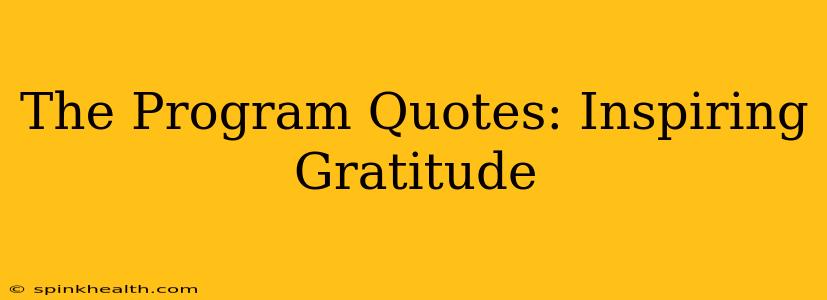Gratitude. It's a simple word, yet it holds immense power to transform our perspectives and enrich our lives. While many programs focus on self-improvement, few tap into the profound impact of cultivating a grateful heart. This article explores the power of gratitude within various programs and delves into inspiring quotes that highlight its transformative potential. We'll examine how gratitude practices are incorporated into different settings, explore the benefits, and answer some frequently asked questions surrounding gratitude's role in personal growth.
What are some examples of programs that incorporate gratitude practices?
Many programs, from corporate wellness initiatives to individual therapy, recognize the importance of incorporating gratitude practices. Examples include:
-
Mindfulness-based stress reduction (MBSR) programs: These programs often include gratitude journaling and mindful reflection exercises as key components for stress management and overall well-being. They help participants recognize the positive aspects of their lives, fostering a sense of appreciation.
-
Cognitive Behavioral Therapy (CBT): CBT therapists often encourage patients to identify and focus on positive aspects of their lives to counter negative thought patterns. Gratitude practices become a valuable tool in shifting perspectives and building resilience.
-
Workplace wellness programs: Companies are increasingly realizing the benefits of incorporating gratitude into the workplace. This can take the form of team-building activities focused on appreciation, employee recognition programs, or simply providing resources for employees to practice gratitude independently.
-
12-step programs: While not explicitly focused on gratitude, many 12-step programs implicitly encourage gratitude through focusing on the positive changes achieved and the support received from the community. Recognizing the progress made is a crucial component of recovery and sustained well-being.
How can gratitude programs improve mental health?
Research consistently demonstrates the positive impact of gratitude on mental health. Practicing gratitude has been linked to:
-
Reduced stress and anxiety: By focusing on positive aspects, gratitude helps shift attention away from stressors, promoting a sense of calm and reducing feelings of anxiety.
-
Improved sleep: Gratitude journaling before bed can help quiet the mind and improve sleep quality. It allows for reflection on the day's positive experiences, promoting relaxation and reducing racing thoughts.
-
Increased happiness and life satisfaction: Regular gratitude practices can lead to a more optimistic outlook and a greater sense of contentment with life. This leads to increased feelings of happiness and overall life satisfaction.
-
Enhanced resilience: When facing challenges, gratitude can help individuals maintain a positive perspective and bounce back more effectively. It fosters a sense of strength and hope, crucial for navigating difficult times.
What are some inspiring quotes about gratitude?
Numerous thinkers and writers have eloquently expressed the power of gratitude. Here are a few inspiring quotes that encapsulate its essence:
-
"Gratitude unlocks the fullness of life. It turns what we have into enough, and more. It turns denial into acceptance, chaos to order, confusion to clarity." - Melody Beattie This quote beautifully summarizes the transformative effect of gratitude, highlighting its ability to shift perspectives and find meaning in challenging situations.
-
"When you are grateful, fear disappears and abundance appears." - Anthony Robbins This emphasizes the connection between gratitude and abundance, suggesting that focusing on what we have opens us up to receiving more.
-
"Gratitude is not only the greatest of virtues, but the parent of all others." - Cicero This quote highlights gratitude as the foundation for other virtuous behaviors, suggesting it's essential for personal growth and ethical development.
How do I start a gratitude practice?
Beginning a gratitude practice is easier than you might think. Here are some simple yet effective techniques:
-
Gratitude journaling: Each day, write down three things you are grateful for. These can be big or small, focusing on both the material and intangible aspects of your life.
-
Gratitude meditation: Take a few moments each day to reflect on things you appreciate. This can be done through guided meditations or simply by focusing on your breath and allowing feelings of gratitude to arise.
-
Expressing gratitude to others: Share your appreciation with people in your life. A simple "thank you" can go a long way in strengthening relationships and boosting your own sense of well-being.
What is the difference between gratitude and appreciation?
While often used interchangeably, gratitude and appreciation have subtle differences. Gratitude involves a feeling of thankfulness for something received, while appreciation involves a deeper understanding and valuing of something's significance. Appreciation may be more contemplative and reflective, while gratitude can be more immediate and emotional.
Can gratitude programs help with physical health?
While primarily associated with mental well-being, emerging research suggests that gratitude may also positively impact physical health. Studies show correlations between gratitude and improved sleep, reduced blood pressure, and enhanced immune function. More research is needed to establish definitive causal links, but the preliminary findings are encouraging.
By incorporating gratitude practices into our lives, whether through structured programs or personal reflection, we unlock the potential for a richer, more fulfilling existence. The power of gratitude lies in its ability to shift our focus from what we lack to what we have, fostering a sense of appreciation and contentment that permeates every aspect of our being.

